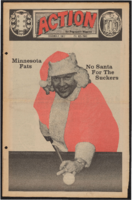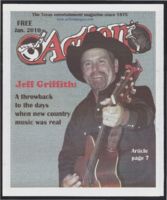Action Magazine, December 1977
Description
Cover story on Minnesota Fats.
Additional machine-extracted names mentioned in this issue: Andy Anderson, Bailey Anderson, Moses Bolibo, Gooder Brown, Johnny Bush, George Chambers, Don Chema, Stanley Clarke, David Allan Coe, La Coste, Pete Drake, Barbara Fairchild, Bobby Flores, Kinky Friedman, Alex Habeeb, Linda Hargrove, Joe Jama, Mary Jane, Danny Levinson, Loretta Lynn, Augie Meyers, Claude Morgan, Willie Nelson, Olivia Newton-John, Larry Patton, Joe Perales, Rick Presley, Paul Ray, Jerry Reed, Jerry Retzloff, Frank Rodarte, Johnny Rodriguez, Roger Santos, David Solis, Joe Sublette, Tammy Wynette, Oscar Zamora, Ray Zule.



